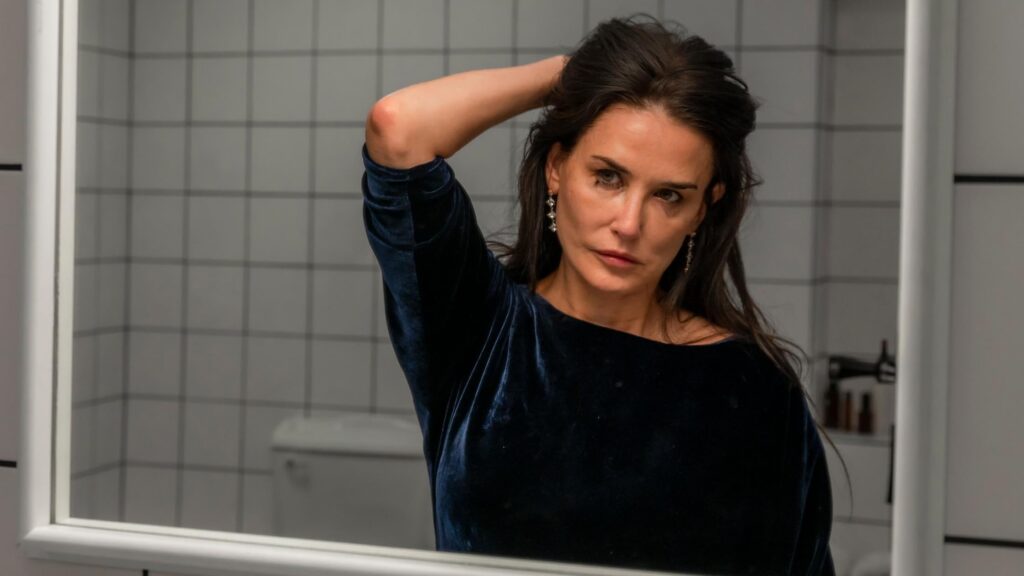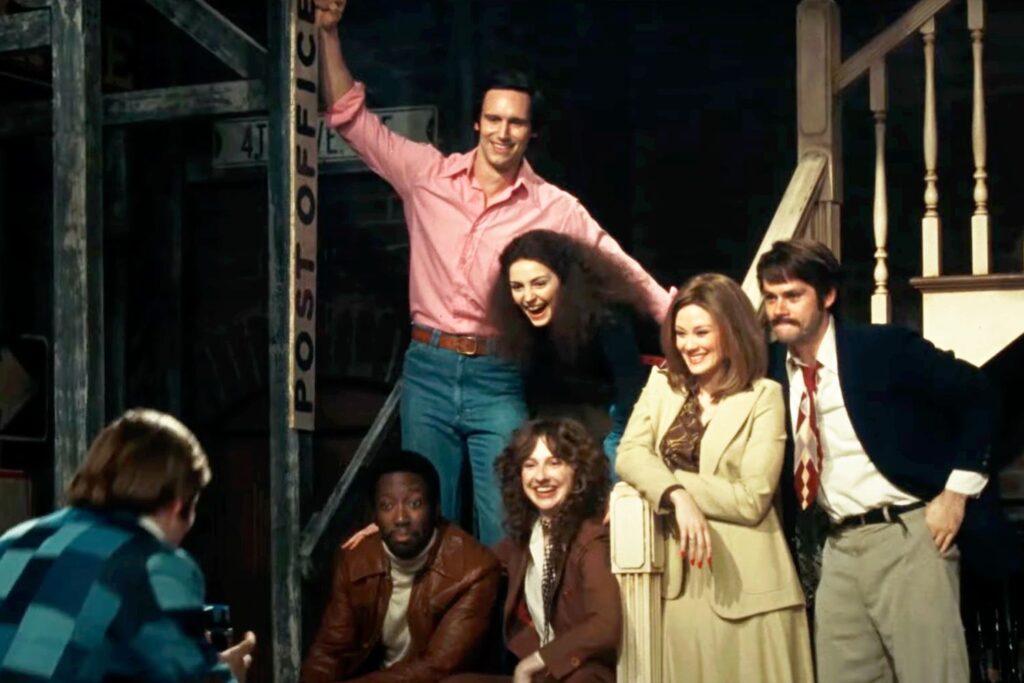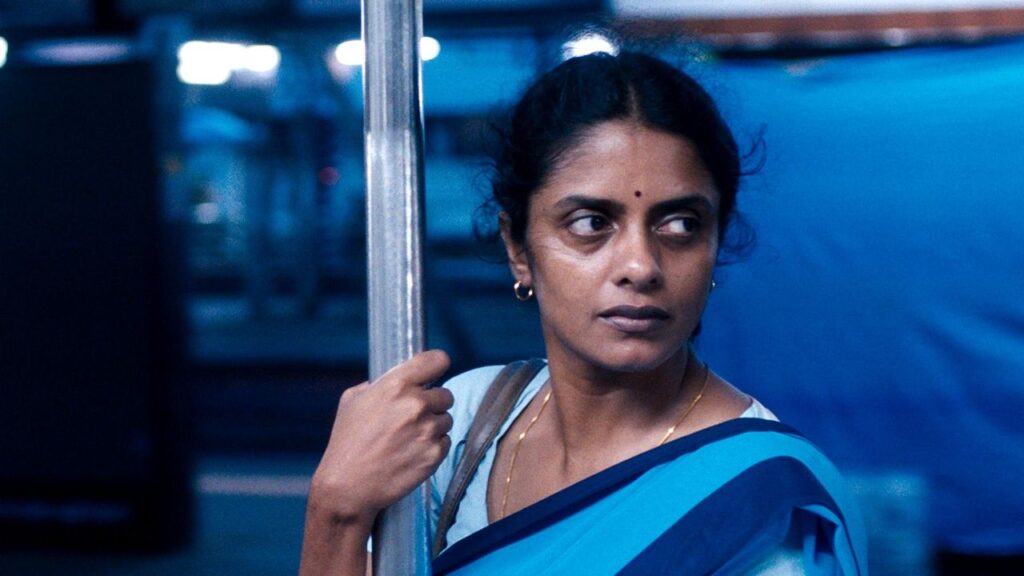Emilia Perez, The Brutalist and Anora are among those nominated for Best Film, Best Director and Best Screenplay
(New York, NY, December 12, 2024) – Since 2006, the Alliance of Women Film Journalists (AWFJ) has presented annual EDA Awards, representing professional women critics’ collective perspectives on movies and cinema culture in the movie awards arena, where female critics and critical opinion are still greatly underrepresented. AWFJ honors female creatives in non-gender specific awards categories and in unique Female Focus categories designated for women only.
This year, Edward Berger’s papal thriller CONCLAVE led all films with 9 nominations, including Best Film, Best Director, Best Screenplay (Adapted), Best Supporting Actress (Isabella Rossellini), Best Actor (Ralph Fiennes), Best Supporting Actor (Stanley Tucci), Best Ensemble Cast and Casting Director, Best Cinematography and Best Editing. Jacques Audiard’s EMILIA PEREZ grabbed 8 nods with Sean Baker’s ANORA and Brady Corbet’s THE BRUTALIST garnering 7; all were nominated for Best Film, Best Director and Best Screenplay (Original or Adapted). In the Female Focus Section, THE SUBSTANCE filmmaker Coralie Fargeat squares off with ALL WE IMAGINE AS LIGHT’S Payal Kapadia for both Best Woman Director and Best Female Screenwriter, with Nykiya Adams (BIRD), Karla Sofia Gascon (EMILIA PEREZ) and Mikey Madison (ANORA) all among those vying for the award for Best Women’s Breakthrough Performance.
“We are proud that this year’s member-determined roster of nominees includes female contenders in non-gender specific categories, including Coralie Fargeat in the Best Film, Best Director and Best Original Screenplay categories, along with Payal Kapadia, who is nominated for Best Director, Best Original Screenplay and Best International Film,” said Jennifer Merin, President of the 90-member AWFJ. “We hope to see similar recognition of women filmmakers at this year’s Oscars and various guild awards, as well as with other critic’s awards groups.”
In preparation for the awards season, AWFJ tracks femme-helmed and femme-centric films released throughout the year. The 2024 list of EDA Award-eligible femme-helmed and/or femme-centric films includes more than 500 titles. Many of these female-made movies are small budget productions that receive neither wide distribution nor critical consideration. This impressive number of independently produced films indicates the high level of female filmmaker proactivity in contradiction to the grim statistics consistently reported in major studies about female film production. AWFJ advocates for acknowledgment of these films and recognition for their filmmakers, not only during awards season, but throughout the year with the Movie of the Week feature published every Monday on AWFJ.org, and other regular features.
The EDAs are named in honor of AWFJ founder Merin’s mother, Eda Reiss Merin, a stage, film and television actress whose career spanned more than 60 years. A dedicated foot soldier in the industry, Eda was one of the founders of AFTRA and a long-standing member of AMPAS. EDA is also an acronym for Excellent Dynamic Activism, qualities shared by Eda Reiss Merin, AWFJ members and those honored with EDA Awards.
Here is the list of nominees:

OFFICIAL 2024 EDA AWARDS NOMINATIONS
BEST OF AWARDS
BEST FILM
- ANORA
- CONCLAVE
- EMILIA PEREZ
- NICKEL BOYS
- SING SING
- THE BRUTALIST
- THE SUBSTANCE
- WICKED
BEST DIRECTOR
- JACQUES AUDIARD – EMILIA PEREZ
- SEAN BAKER – ANORA
- EDWARD BERGER – CONCLAVE
- BRADY CORBET – THE BRUTALIST
- CORALIE FARGEAT – THE SUBSTANCE
- PAYAL KAPADIA – ALL WE IMAGINE AS LIGHT

BEST SCREENPLAY, ORIGINAL
- ALL WE IMAGINE AS LIGHT – PAYAL KAPADIA
- ANORA – SEAN BAKER
- A REAL PAIN – JESSE EISENBERG
- HARD TRUTHS – MIKE LEIGH
- THE SUBSTANCE – CORALIE FARGEAT
- THE BRUTALIST – BRADY CORBET AND MONA FASTVOLD
BEST SCREENPLAY, ADAPTED
- CONCLAVE – PETER STRAUGHAN, ROBERT HARRIS
- EMILIA PEREZ – JACQUES AUDIARD, THOMAS BIDEGAIN, LEA MYSIUS
- NICKEL BOYS – RaMell ROSS, JOSLYN BARNES, COLSON WHITEHEAD
- NOSFERATU – ROBERT EGGERS
- SING SING – JOHN H. RICHARDSON, BRENT BUELL, CLINT BENTLEY
- THE WILD ROBOT – CHRIS SANDERS, PETER BROWN

BEST DOCUMENTARY
- BLACK BOX DIARIES – SHIDORI ITO
- DAHOMEY – MATI DIOP
- DAUGHTERS – ANGELA PATTON, NATALIE RAE
- THE LAST OF THE SEA WOMEN – SUE KIM
- SUGARCANE – EMILY KASSIE, JASON BRAVE NOISECAT
- WILL & HARPER – JOSH GREENBAUM
BEST ANIMATED FILM
- FLOW
- HUNDREDS OF BEAVERS
- INSIDE OUT 2
- MEMOIR OF A SNAIL
- THE WILD ROBOT
- WALLACE & GROMIT: VENGEANCE MOST FOWL

BEST ACTRESS
- CYNTHIA ERIVO – WICKED
- KARLA SOFIA GASCON – EMILIA PEREZ
- MARIANNE JEAN-BAPTISTE – HARD TRUTHS
- MIKEY MADISON – ANORA
- DEMI MOORE – THE SUBSTANCE
- JUNE SQUIBB – THEMA
BEST ACTRESS, SUPPORTING
- JOAN CHEN – DIDI
- DANIELLE DEADWYLER – THE PIANO LESSON
- AUNJANUE ELLIS-TAYLOR – NICKEL BOYS
- MARGARET QUALLEY – THE SUBSTANCE
- ISABELLA ROSSELLINI – CONCLAVE
- ZOE SALDANA – EMILIA PEREZ
BEST ACTOR
- ADRIEN BRODY – THE BRUTALIST
- DANIEL CRAIG – QUEER
- COLMAN DOMINGO – SING SING
- RALPH FIENNES – CONCLAVE
- HUGH GRANT – HERETIC
- SEBASTIAN STAN – THE APPRENTICE
BEST ACTOR, SUPPORTING
- YURA BORISOV – ANORA
- KIERAN CULKIN – A REAL PAIN
- CLARENCE MACLIN – SING SING
- GUY PEARCE – THE BRUTALIST
- STANLEY TUCCI – CONCLAVE
- DENZEL WASHNGTON – GLADIATOR II

BEST ENSEMBLE CAST AND CASTING DIRECTOR
- ANORA
- CHALLENGERS
- CONCLAVE
- EMILIA PEREZ
- SATURDAY NIGHT
- WICKED
BEST CINEMATOGRAPHY
- CONCLAVE
- DUNE II
- NICKEL BOYS
- NOSFERATU
- THE BRUTALIST
- WICKED
BEST EDITING
- ANORA
- CONCLAVE
- EMILIA PEREZ
- FURIOSA: A MAD MAX SAGA
- THE BRUTALIST
- THE SUBSTANCE

BEST INTERNATIONAL FILM
- ALL WE IMAGINE AS LIGHT
- DAHOMEY
- EMILIA PEREZ
- FLOW
- LA CHIMERA
- THE SEED OF THE SACRED FIG
EDA FEMALE FOCUS AWARDS
EDA FEMALE FOCUS: BEST WOMAN DIRECTOR
- ANDREA ARNOLD – BIRD
- GIA COPPOLA – THE LAST SHOWGIRL
- CORALIE FARGEAT – THE SUBSTANCE
- PAYAL KAPADIA – ALL WE IMAGINE AS LIGHT
- MEGAN PARK – MY OLD ASS
- ALICE ROHRWACHER – LA CHIMERA

EDA FEMALE FOCUS: BEST FEMALE SCREENWRITER
- ANDREA ARNOLD – BIRD
- CORALIE FARGEAT – THE SUBSTANCE
- PAYAL KAPADIA – ALL WE IMAGINE AS LIGHT
- MEGAN PARK – MY OLD ASS
- ALICE ROHRWACHER – LA CHIMERA
- ERICA TREMBLAY, MICIANA ALISE – FANCY DANCE
EDA FEMALE FOCUS: BEST ANIMATED/VOICED PERFORMANCE
- AYO EDEBIRI – INSIDE OUT 2
- MAYA HAWKE – INSIDE OUT 2
- LUPITA NYONG’O – THE WILD ROBOT
- AMY POEHLER – INSIDE OUT 2
- SARAH SNOOK – MEMOIR OF A SNAIL
- JACKI WEAVER – MEMOIR OF A SNAIL

EDA FEMALE FOCUS: BEST WOMEN’S BREAKTHROUGH PERFORMANCE
- NYKIYA ADAMS – BIRD
- KARLA SOFIA GASCON – EMILIA PEREZ
- MIKEY MADISON – ANORA
- KATY O’BRIAN – LOVE LIES BLEEDING
- JUNE SQUIBB – THELMA
- MAISY STELLA – MY OLD ASS
EDA FEMALE FOCUS: BEST STUNT PERFORMANCE
- NIKKI BERWICK – STUNT COORDINATOR, GLADIATOR II
- ALEX JAY (for ZENDAYA) – DUNE II
- HAYLEY WRIGHT (for ANYA TAYLOR-JOY) – FURIOSA
- KATY O’BRIAN – LOVE LIES BLEEDING
- CAILEE SPAENY – ALIEN ROMULUS
- JUNE SQUIBB – THELMA

ABOUT THE ALLIANCE OF WOMEN FILM JOURNALISTS
The Alliance of Women Film Journalists, Inc. (AWFJ) is a not-for-profit professional association of highly qualified female movie critics, reporters and feature writers working in print, broadcast and online media, dedicated to supporting work by and about women – both in front of and behind the cameras – through intra-group promotional activities, outreach programs and by presenting awards in recognition of outstanding accomplishments (the best and worst) by and about women in the movies. AWFJ was founded in 2006 by Jennifer Merin, Maitland McDonagh, Joanna Langfield and Jenny Halper. In addition to the year end awards, AWFJ presents EDA Awards at partner festivals, keeps an active and interactive record of fiction feature and documentary films by and/or about women, and/or are of particular interest to women because they focus on women’s issues. We welcome information that will allow us to keep our lists updated. Lists are made available to members and the general public on our Web site at AWFJ.org. For further information, contact AWFJ President Jennifer Merin at [email protected].

Lynn (Zipfel) Venhaus has had a continuous byline in St. Louis metro region publications since 1978. She writes features and news for Belleville News-Democrat and contributes to St. Louis magazine and other publications.
She is a Rotten Tomatoes-approved film critic, currently reviews films for Webster-Kirkwood Times and KTRS Radio, covers entertainment for PopLifeSTL.com and co-hosts podcast PopLifeSTL.com…Presents.
She is a member of Critics Choice Association, where she serves on the women’s and marketing committees; Alliance of Women Film Journalists; and on the board of the St. Louis Film Critics Association. She is a founding and board member of the St. Louis Theater Circle.
She is retired from teaching journalism/media as an adjunct college instructor.







